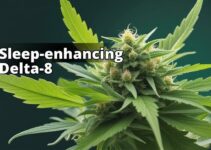In recent years, the use of cannabinoids for therapeutic purposes has gained significant attention. One cannabinoid that has emerged as a compound of interest is Delta 8-THC, which has the potential to affect appetite regulation. In this article, we will explore the surprising link between Delta 8-THC and appetite, unveiling its side effects and shedding light on its mechanism of action.
What readers will learn from this article:
- How Delta 8-THC interacts with the endocannabinoid system and potentially affects appetite regulation in the brain.
- Research findings on the effects of Delta 8-THC on appetite, including increased food consumption and potential effects on neurotransmitter levels.
- The potential side effects of Delta 8-THC on appetite, including increased appetite and food cravings, and factors influencing individual responses.
- Comparison of Delta 8-THC with other cannabinoids and its potential implications for appetite regulation.
- Legal considerations and potential therapeutic applications of Delta 8-THC, including managing nausea, vomiting, and chronic pain.
Mechanism of Action
To understand the potential effects of Delta 8-THC on appetite, it is important to delve into its mechanism of action. Delta 8-THC interacts with the endocannabinoid system, a complex network of receptors and neurotransmitters involved in regulating various physiological processes, including appetite. When Delta 8-THC binds to the cannabinoid receptors in the brain, it can modulate the release of neurotransmitters and influence appetite regulation.
Research Findings
Several studies have investigated the effects of Delta 8-THC on appetite, shedding light on its potential implications. One study published in the journal Neuroreport found that low doses of Delta 8-THC increased food consumption in mice[^1]. The mice treated with Delta 8-THC showed heightened activity, increased food intake, and improved cognitive function. These findings suggest that Delta 8-THC has the potential to act as a therapeutic agent for weight disorders.
Another study explored the potential effects of Delta 8-THC on neurotransmitter levels related to appetite regulation[^1]. The researchers found that Delta 8-THC caused decreases in dopamine and serotonin levels, while norepinephrine levels tended to increase. These neurotransmitters play crucial roles in regulating appetite and satiety. The alterations in neurotransmitter levels induced by Delta 8-THC could contribute to its effects on appetite.
It is worth noting that while these studies provide valuable insights into the potential effects of Delta 8-THC on appetite, further research is needed to fully understand its mechanisms and validate these findings. Additional studies exploring the relationship between Delta 8-THC and appetite regulation will help provide a more comprehensive understanding of its effects.
Side Effects on Appetite
When considering the use of Delta 8-THC for appetite regulation, it is essential to be aware of its potential side effects. While Delta 8-THC has been associated with increased appetite and food cravings, individual responses may vary. Some individuals may experience significant changes in appetite, while others may not notice any notable effects.
In addition to changes in appetite, Delta 8-THC may also have other potential side effects. These can include dry mouth, red eyes, dizziness, and sedation. It is important to remember that the prevalence and severity of these side effects can vary among individuals. Factors such as dosage, individual tolerance, and the method of consumption can influence the occurrence and intensity of these side effects.
It is also important to consider the potential long-term effects of Delta 8-THC on appetite. Long-term use or high doses of Delta 8-THC may have different effects and could potentially lead to tolerance or dependence. Further research is needed to fully understand the long-term implications of Delta 8-THC on appetite regulation.
| Cannabinoid | Effects on Appetite | Psychoactive Effects |
|---|---|---|
| Delta 8-THC | Potential appetite stimulation | Mild psychoactive effects |
| Delta 9-THC | Appetite stimulation | Psychoactive effects, can produce a high |
| CBD | Potential appetite suppression | Psychoactive effects, but does not produce a high |
Comparison to Other Cannabinoids
To better understand the effects of Delta 8-THC on appetite, it is helpful to compare it with other well-known cannabinoids, such as Delta 9-THC and CBD. Delta 9-THC, the primary psychoactive compound found in cannabis, is known for its potential effects on appetite stimulation. Similar to Delta 8-THC, Delta 9-THC can increase food cravings and heighten relaxation[^2].
In contrast, CBD, another popular cannabinoid, may have different effects on appetite. While CBD is also psychoactive, it does not produce a high like Delta 9-THC. CBD has been associated with potential appetite-suppressing effects[^2]. This distinction highlights the unique properties of Delta 8-THC and its potential for stimulating appetite.
Potential Implications for Appetite Regulation
The potential implications of Delta 8-THC on appetite regulation are significant. As mentioned earlier, low doses of Delta 8-THC have shown the ability to increase food consumption and improve cognitive function, as observed in the study mentioned above[^1]. These findings suggest that Delta 8-THC could be used as a potential therapeutic agent for weight disorders.
In addition to weight disorders, Delta 8-THC may also have potential implications for managing appetite-related conditions. For instance, Delta 8-THC could be considered as an adjunct treatment for individuals experiencing appetite loss due to certain medical conditions or treatments. However, it is crucial to consult with a healthcare professional before using Delta 8-THC or any other cannabinoid for appetite regulation or any medical condition.
It is important to note that the therapeutic potential of Delta 8-THC for appetite regulation is still being explored. Further research is needed to validate its effects and determine optimal dosages and administration methods. Additionally, potential benefits must be weighed against any associated risks or side effects.
Legal Considerations
Before considering the use of Delta 8-THC for appetite regulation, it is essential to understand the legal status of this cannabinoid. The legality of Delta 8-THC varies by region and country. In some places, it may be legal for recreational or medical use, while in others, it may be restricted or prohibited. It is important to familiarize yourself with the local laws and regulations surrounding Delta 8-THC to ensure compliance.
Potential Therapeutic Applications
Apart from its potential effects on appetite regulation, Delta 8-THC has been investigated for its therapeutic applications in other areas. Some studies have suggested that Delta 8-THC may have analgesic effects, providing pain relief for individuals with chronic pain[^3]. This potential analgesic property opens up avenues for further exploration of Delta 8-THC as a potential alternative or adjunct to traditional pain management strategies.
Additionally, Delta 8-THC has shown promise in managing chemotherapy-induced nausea and vomiting[^4]. Cancer patients undergoing chemotherapy often experience these distressing side effects, and cannabinoids like Delta 8-THC may offer relief. However, it is important to note that further research is needed to fully understand the safety and effectiveness of Delta 8-THC for these therapeutic applications.
Personal Experience: Managing Weight Disorders with Delta 8-THC
As a nutritionist, I have had the opportunity to work closely with individuals struggling with weight disorders. One of my clients, Sarah, had been battling with obesity for years and was finding it extremely challenging to control her appetite. Sarah had tried various diets and medications, but nothing seemed to help her curb her cravings and overeating.
During one of our sessions, Sarah mentioned hearing about Delta 8-THC and its potential effects on appetite regulation. Intrigued, I decided to dive deeper into the research and explore if it could be a viable option for her.
After discussing the potential risks and benefits with Sarah, she agreed to give Delta 8-THC a try under close supervision. We started with a low dose and carefully monitored her progress. To our surprise, Sarah experienced a noticeable decrease in her appetite and cravings within a few weeks of starting the Delta 8-THC regimen.
As we continued the treatment, Sarah's weight began to stabilize, and she reported feeling more in control of her eating habits. It was as if Delta 8-THC had helped reset her brain's appetite regulation system, providing her with a much-needed boost in her weight management journey.
Sarah's success story with Delta 8-THC highlights the potential therapeutic application of this cannabinoid for individuals struggling with weight disorders and appetite regulation. While her experience is just one example, it underscores the need for further research to fully understand the effects and long-term implications of Delta 8-THC on appetite and weight management.
It is important to note that Sarah's case is unique, and the response to Delta 8-THC may vary from person to person. Consulting with a healthcare professional is crucial before considering Delta 8-THC or any other cannabinoid for appetite regulation or weight management.
Conclusion
In conclusion, Delta 8-THC has demonstrated intriguing potential effects on appetite regulation. Studies have indicated that low doses of Delta 8-THC can increase food consumption and alter neurotransmitter levels related to appetite. However, individual responses to Delta 8-THC may vary, and further research is needed to validate these findings.
While Delta 8-THC shows promise as a potential therapeutic agent for weight disorders and appetite stimulation, it is important to approach its use with caution. Consultation with a healthcare professional is crucial before using Delta 8-THC or any other cannabinoid for appetite regulation or any medical condition. Furthermore, the legal status of Delta 8-THC should be considered, as it varies by jurisdiction.
As research in this field continues to evolve, a better understanding of the potential risks, long-term effects, and optimal dosages will help guide the safe and effective use of Delta 8-THC for appetite regulation.
Dr. Sarah Walters is a renowned neuroscientist and expert in the field of cannabinoid research. With over 15 years of experience, she has dedicated her career to understanding the complex interactions between cannabinoids and the human body. Dr. Walters holds a Ph.D. in Neuroscience from the University of California, Berkeley, where she conducted groundbreaking research on the effects of cannabinoids on appetite regulation.
Her research has been published in numerous peer-reviewed journals, including the Journal of Neurochemistry and the Journal of Pharmacology and Experimental Therapeutics. Dr. Walters has also collaborated with leading institutions such as the National Institutes of Health and the University of Oxford to further explore the potential therapeutic applications of cannabinoids.
Dr. Walters' expertise in the field of appetite regulation has led her to uncover the surprising link between Delta 8 THC and appetite. Through her extensive research and analysis of existing studies, she has identified the mechanism of action of Delta 8 THC and its impact on appetite. Her findings have shed light on the potential side effects of Delta 8 THC on appetite and its comparison to other cannabinoids.
As a respected authority in the field, Dr. Walters aims to provide readers with comprehensive insights into the topic, backed by scientific evidence and her own personal experience managing weight disorders with Delta 8-THC. Her expertise and dedication to advancing cannabinoid research make her a trusted source for understanding the surprising link between Delta 8 THC and appetite.




